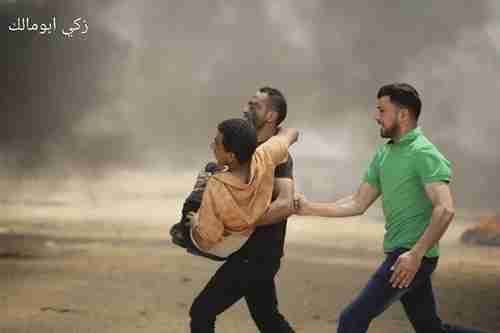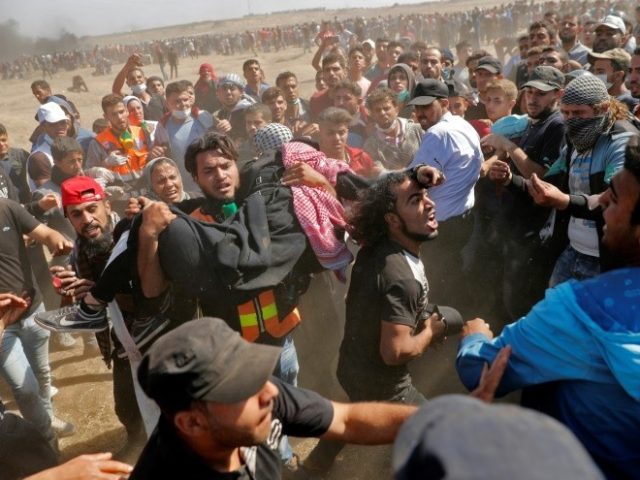This morning’s key headlines from GenerationalDynamics.com
- Gaza violence surges in Palestinian ‘Great March for Return’ into Israel
- Opening of U.S. embassy in Jerusalem stirs strong reactions
Gaza violence surges in Palestinian ‘Great March for Return’ into Israel

A child is carried by Palestinians away from the front lines after he was shot. The smoke is created by burning tires that the Palestinians use to hide from the Israel troops (Ma’an News)
Dozens of residents of Gaza were killed and over 2000 injured in a clash with Israeli troops in what Palestinians are calling “The Great March for Return,” resulting in the greatest surge of violence in Gaza since the 2014 war between Israel and Hamas.
Israel said some 40,000 Palestinians had taken part in violent riots at 13 locations along the Gaza Strip security fence. Monday’s march is the culmination of six weeks of similar marches that began late in March. The pattern is always the same. Thousands of Gazans march to the border with Israel, threatening to break through the fence into Israel. Israel’s army tries to stop them, first using tear gas, then rubber bullets, and eventually using live fire, resulting in casualties.
Hamas, the governing authority of Gaza, has been calling these demonstrations the “Great March for Return,” meaning that it is accompanied by demands for “Right of Return,” the demand that Palestinians be permitted to return to the land that they lost in the Arab-Jewish war in 1948. For that reason, the attempt by thousands of Gazans to breach the fence and cross over into Israel is considered an existential threat to Israel by the Israelis.
According to reports by both media and Israeli officials, Hamas directed women and children to sit near the border fence, and then the men used the women and children as shields while throwing rocks and Molotov cocktails over the fence at soldiers. I cannot think of any explanation for this except Palestinian politics – to incite as many killings of women and children as possible, in order to trigger international condemnation of Israel. Times of Israel and Ma’an News (Palestine) and BBC
Opening of U.S. embassy in Jerusalem stirs strong reactions
On Monday, the U.S. embassy in Israel officially moved from Tel Aviv to Jerusalem. U.S. Ambassador David Friedman and Treasury Secretary Steven Mnuchin unveiled a plaque officially denoting the building as the U.S. embassy. The building is already in use as an American visa-and-passport facility, and the new embassy will occupy a portion of the building with a small staff. David Friedman will be traveling back and forth between the new Jerusalem embassy and his main offices in Tel Aviv.
So very little of substance occurred on Monday with the move of the U.S. embassy in Jerusalem. But the reactions to the move indicate that it has a very high symbolic significance. It was the occasion of gleeful, euphoric bragging by Israeli officials at the dedication ceremony, as contrasted to angry, somber, furious expressions by Palestinian leaders.
While most international comments were restrained, some strongly condemned Israel for either the embassy move or the Gaza violence or both.
Zeid Ra’ad al-Hussein, the UN High Commissioner for Human Rights, condemned the “shocking killing of dozens, injury of hundreds by Israeli live fire.”
Turkey called the Gaza violence a “vile massacre,” and recalled its ambassadors from both U.S. and Israel. South Africa also recalled its ambassador to Israel, condemning “the indiscriminate and grave manner of the latest Israeli attack.”
Numerous countries, including France, Germany, and Saudi Arabia, referred to the embassy move to Jerusalem as “dangerous,”, “catastrophic,” “irresponsible,” and “against international law.”
I hear journalists, politicians, and analysts say all the time that “Nobody wants a war.” That is not true. Lots of people want wars. As I described in an article last year, the public can become heavily invested in starting a war, and extremely euphoric when the war actually begins, as most of the public is under the delusion that they will win quickly.
That euphoria lasts until there is a major setback. According to General Carl von Clausewitz, the effects on the people and the government “is a sudden collapse of the wildest expectations, and total destruction of self-confidence. The destruction of these feelings creates a vacuum, and that vacuum gets filled by a fear that grows corrosively, leading to total paralysis.”
Gaza’s population clearly has an overwhelming desire for another war with Israel. They presumably have been told by Hamas leaders that this time Hamas will win. I have heard Marwan Bishara, the lead analyst on al-Jazeera, imply that Mahmoud Abbas and the Palestinian Authority are traitors to Palestinians because they sought peace rather than war with Israel.
The dreams of an easy victory over Israel are completely delusional. In a generational Crisis era, Israel will never surrender or compromise. If the war starts going badly for Israel, nuclear weapons will be used.
As I have written many times, Generational Dynamics predicts that the Mideast is headed for a major regional war refighting the 1948 war between Jews and Arabs that followed the partitioning of Palestine and the creation of the state of Israel. The war will also pit Sunnis versus Shias and various ethnic groups against each other. Generational Dynamics predicts that in the approaching Clash of Civilizations world war, the “axis” of China, Pakistan, and the Sunni Muslim countries will be pitted against the “allies,” the U.S., India, Russia, and Iran.
Monday was supposed to be the culmination of the “Great March for Return” marches. In view of all the violence, it is possible that the marches will now fizzle out for a while, or it is possible that they will escalate into a regional conflict. Times of Israel and Al Jazeera and BBC and Washington Post
Related Articles:
- Mideast Roadmap – Will it bring peace? (01-May-2003)
- Gaza Palestinians burn tires to hide protests from Israel’s army (07-Apr-2018)
- Gaza Palestinian ‘Land Day’ demonstrations lead to violence with Israel’s army (01-Apr-2018)
- Israel announces that it will ban al-Jazeera in Israel (07-Aug-2017)
- US embassy to Jerusalem will commemorate Israel’s founding — Palestinian ‘Naqba Day’ (24-Feb-2018)
- Palestinian reconciliation talks ignore Hamas commitment to destroy Israel (12-Oct-2017)
- Channeling Sisyphus, Trump and Abbas say Mideast peace not as hard as it looks (04-May-2017)
KEYS: Generational Dynamics, Israel, Gaza, Jerusalem, Hamas, Great March for Return, David Friedman, Zeid Ra’ad al-Hussein, Marwan Bishara, Steven Mnuchin
Permanent web link to this article
Receive daily World View columns by e-mail

COMMENTS
Please let us know if you're having issues with commenting.